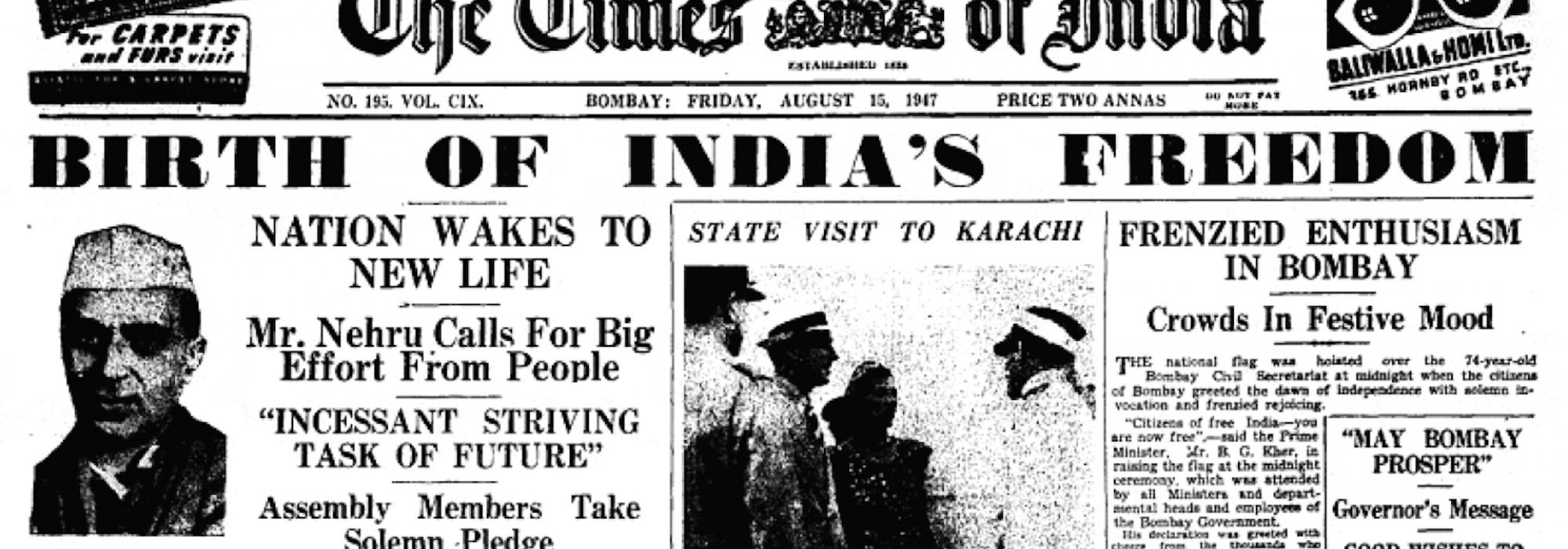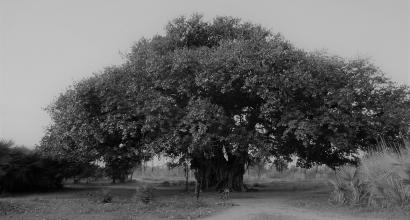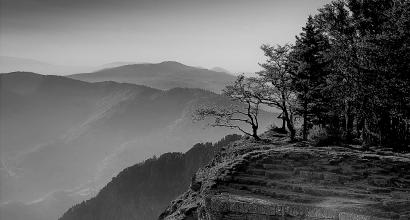Today is indeed a very happy day for all of us in this country. This is truly a rare kind of joy. It appears that at previous juncture throughout the history of this country did we experience such happiness. The great lord of the world, Ishwara has bestowed this matchless fortune on us and has blessed us.
--- 1 ---
However, there is an enormous responsibility that rides on the back of every such great joy. The festival of marriage is accompanied by the responsibility of building a family. The joy when a child is born is accompanied by the responsibility of bringing it up properly. While immersed in such happiness and celebration, is typical for our youth not to remind themselves of such responsibilities. Neither do they like such reminders. However, if elders do not sound these reminders, the joy of our youth will only be momentary. Therefore, on this occasion of celebrating our independence, let us turn our mind a little towards responsibility.
When did India truly have freedom? And why did it slip away? These are questions we need to ponder upon. Generally speaking, a country that is agreeable in every way and is an ideal state is known as Rama Rajya. This ideal is merely a memory in our times. Gandhi ji himself has repeatedly stressed that Rama Rajya is the ideal state. However, there is an intriguing element in this. In a Rama Rajya there could exist all the noble and virtuous qualities that we all want and need. All qualities except one: the strength to realize our faults and weaknesses and the ability of self-correction each time a mistake occurs. Thus, that perfect and the most exalted kingdom attained all the great heights but could not sustain itself till eternity because of the absence of this crucial, aforementioned quality. Nobody should conclude that we are finding fault with Sri Ramachandra because we said these words. Rama Rajya attained its pristine status because of Sri Rama. It is the force of his personality. Ever since, we have lost Rama Rajya because we don’t possess Sri Rama’s nature. The fault is not Sri Rama’s, but ours. The condition of our country is directly proportional to our own virtues or the lack thereof. In other words, as the citizen so the nation.
It took the entire duration from Sri Ramachandra’s period up to the present time for the Indian people to realise this principle. As the matured fruit of numerous events and experiences, we are at present learning the principle, as the citizen so the nation. In this context, let us recall our history a bit. Perhaps until Alexander came all the way on his expedition of conquest, Bharatavarsha hadn’t experienced the blows from alien nations. The feeling that Bharata was one indivisible unit all the way from the Himalaya up to Lanka had taken deep and pervasive root among our people centuries before Alexander struck. Perhaps the first chapter of India’s indivisible geographical unity in her indivisible story was the Ramayana. More specifically, when Sri Rama entered the Dandakaranya, walked up to the southernmost sea, built the bridge, won Lanka and then returned to Ayodhya.
--- 2 ---
Although this vision and national feeling of Bharatavarsha’s geographical indivisibility and wholeness existed since countless centuries in the ancient past, inside these boundaries there also existed numerous Deshas (not to be understood in the sense of “nation”) and hostilities among them. Small regional kingdoms plagued by internecine warfare and competition had taken deep roots by the time of Alexander. History is settled on the fact that our kings of that era motivated by such internal wars became ready to offer assistance to Alexander. This was the condition in 326 BCE. That is, about 2300 years before the present time. In that era, although Bharatavarsha was independent in the eyes of the rest of the world, it was chaotic within itself. After that, the full fruit of this chaos became crystal clear.
Alexander stayed in India for a few days and then departed. Whatever little power he had left behind here eventually disappeared. However, around 1001 CE, that is, about 900 years earlier, when Mahmud invaded India from Ghazni, the bitter fruit of the selfsame disunity among Hindu kings inevitably became the lot of everybody. In Ashoka Chakravartin’s zealous propagation of Dharma, and in Adi Shankaracharya’s establishment of the synthesis of the Six Matas from Kerala to Himalaya regarding it as his Empire of scholarship (Vidwat-Rajya)—in both these cases, we see the same sentiment of Bharatavarsha’s indivisibility. However, both Ashoka and Adi Sankaracharya’s Dharmic and philosophical aim did not find any expression or form in the political realm. The exact consequence of this lacuna was the unremitting warfare and jealousies among our Hindu kings. It is solely owing to their personal hatred and jealousy that they made space for or invited alien kings. This is how the bird of freedom flew away from Bharatavarsha: opposing groups arose because there was no unity; opposing groups gave rise to our people fighting one another; this infighting led to the entry of foreigners; the entry of foreigners meant the loss of independence.
There is another aspect that we need to consider in this chain of reasoning. Sure, our kings of the past might have fought amongst themselves. However, did their subjects also fight in a similar fashion? If they did not, then why were they unable to stop these foreign invasions? But when we examine historical realities, it is clear that our kings could not accomplish much singlehandedly, that is, without the full support of their subjects. A simple force of a few score people or hundreds of people cannot be called a war by any stretch, and therefore cannot make a pervasive impact on large swathes of the country. The infighting among the kings of those days became extremely effective because they had the full support of almost all their subjects. In that case, it only means that the ordinary citizens of those days lacked enough political (Ed: in the sense that we understand this term today) understanding and had little influence in the political realm. This is the reason why the independence that India enjoyed naturally, became imperiled over time. Because there was no political awareness and political power among the common people that Bharatavarsha was colonized.
To be continued.
Note: This is the first part of an English translation of D.V. Gundappa's Kannada essay titled Swatantrya Divasada Mahatvada Sanketa, part of the anthology of his essays titled, Rajakiya Prasangagalu - 1.
















































